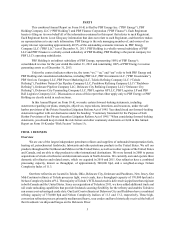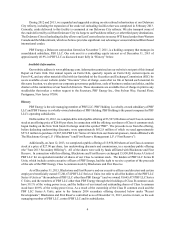PBF Energy 2013 Annual Report Download - page 20
Download and view the complete annual report
Please find page 20 of the 2013 PBF Energy annual report below. You can navigate through the pages in the report by either clicking on the pages listed below, or by using the keyword search tool below to find specific information within the annual report.13
major oil companies. For the years ended December 31, 2013, 2012 and 2011, gasoline and distillates accounted
for 88.6%, 88.8% and 88.1% of our revenues, respectively.
Customers
We sell a variety of refined products to a diverse customer base. We currently have product offtake agreements
in place for a large portion of our clean product sales. For the year ended December 31, 2013, MSCG and Sunoco
accounted for 29% and 10% of our revenues, respectively. The remainder of our refined products are primarily
sold through short-term contracts or on the spot market. As of December 31, 2013, Sunoco accounted for 10% of
accounts receivable.
For the year ended December 31, 2012, MSCG and Sunoco accounted for 57% and 10% of the Company’s
revenues, respectively. As of December 31, 2012, Statoil and Sunoco accounted for 28% and 10% of accounts
receivables, respectively.
For the year ended December 31, 2011, MSCG and Sunoco accounted for 52% and 12% of the Company’s
revenues, respectively.
Seasonality
Demand for gasoline is generally higher during the summer months than during the winter months due to
seasonal increases in highway traffic and construction work. Decreased demand during the winter months can
lower gasoline prices. As a result, our operating results for the first and fourth calendar quarters may be lower than
those for the second and third calendar quarters of each year. Refining margins remain volatile and our results of
operations may not reflect these historical seasonal trends.
Competition
The refining business is very competitive. We compete directly with various other refining companies both
on the East and Gulf Coasts and in the Midcontinent, with integrated oil companies, with foreign refiners that
import products into the United States and with producers and marketers in other industries supplying alternative
forms of energy and fuels to satisfy the requirements of industrial, commercial and individual consumers. Some
of our competitors have expanded the capacity of their refineries and internationally new refineries are coming on
line which could also affect our competitive position.
Profitability in the refining industry depends largely on refined product margins, which can fluctuate
significantly, as well as crude oil prices and differentials between the prices of different grades of crude oil, operating
efficiency and reliability, product mix and costs of product distribution and transportation. Certain of our
competitors that have larger and more complex refineries may be able to realize lower per-barrel costs or higher
margins per barrel of throughput. Several of our principal competitors are integrated national or international oil
companies that are larger and have substantially greater resources. Because of their integrated operations and larger
capitalization, these companies may be more flexible in responding to volatile industry or market conditions, such
as shortages of feedstocks or intense price fluctuations. Refining margins are frequently impacted by sharp changes
in crude oil costs, which may not be immediately reflected in product prices.
The refining industry is highly competitive with respect to feedstock supply. Unlike certain of our competitors
that have access to proprietary controlled sources of crude oil production available for use at their own refineries,
we obtain substantially all of our crude oil and other feedstocks from unaffiliated sources. The availability and
cost of crude oil is affected by global supply and demand. We have no crude oil reserves and are not engaged in
the exploration or production of crude oil. We believe, however, that we will be able to obtain adequate crude oil
and other feedstocks at generally competitive prices for the foreseeable future.
























